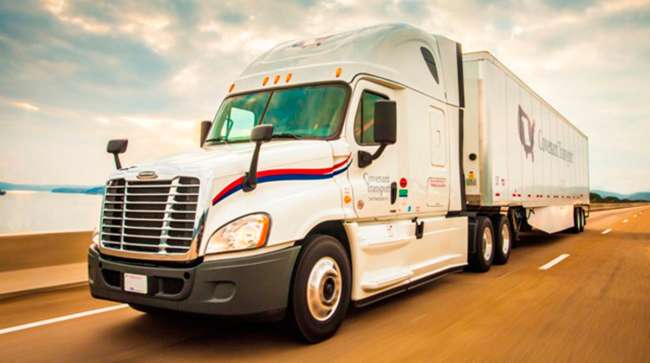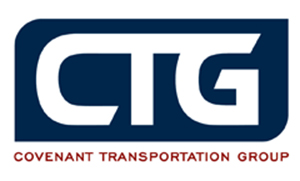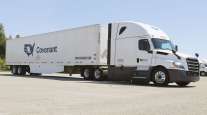Covenant Reports Higher 4Q Profits

Covenant Transportation Group reported higher profits from its dry van and refrigerated truckload operations in the final quarter of 2017, but earnings for the full year declined as the company was unable to supply enough trucks to take full advantage of increased demand for freight shipping during the peak holiday season.

With fewer of its own trucks available to handle demand, CEO David Parker said the Chattanooga, Tenn.-based carrier was forced to obtain capacity from owner-operators and third-party transportation service providers at a higher cost, which cut into profits.
Covenant is one of several truckload carriers that haul freight using team drivers to provide expedited delivery for shippers, such as Amazon.com Inc., that sell goods online. Covenant averaged 912 teams during the fourth quarter of 2017 compared with 1,032 teams in the same period in 2016. The company also had more trucks unseated, with 5.2% of its fleet idle for lack of drivers in the fourth quarter versus 4.8% a year ago.
“We continue to evaluate the most effective level of participation in the peak season and the manner of allocating our assets and coordinating third-party capacity,” Parker said in a news release Jan. 29. “Even though remaining our most profitable quarter of each year, the results of the past two peak seasons have been disappointing, especially considering the planning time and strain this period places on our organization.”
Parker said the duration of what is considered peak season has shrunk in recent years and now extends over just a five-week period beginning the week of Thanksgiving and ending on Christmas Eve.
The shorter shipping cycle reduces the revenue opportunity and creates other challenges, Parker said, including additional cost for moving trailers and more staffing, creating expenses that carry over into the first quarter.
In 2018, Parker said the company will make changes to its pricing models “to ensure we are appropriately rewarded for our efforts related to this valuable annual shipping period.”

Parker
In the three months ended Dec. 31, Covenant posted net income of $49.3 million, or $2.68 a share, compared with net income of $6 million, or 33 cents a share, in the same period in 2016. Revenue rose 6.5% to $203.3 million in 2017 from $191 million in 2016.
Excluding the impact of recently enacted Tax Cuts and Jobs Act, which boosted fourth quarter earnings by $40.1 million, or $2.18 a share, Covenant earned $14.8 million in the fourth quarter of 2017 versus $12.3 million in 2016. The company’s operating ratio, calculated by dividing operating expenses by freight revenue, improved to 91.8 from 92.9.
For the year, Covenant said net income hit $55.4 million, or $3.02 a share, on revenue of $705 million in 2017 versus $16.8 million, or 92 cents, in 2016. Excluding the tax windfall, Covenant posted operating income of $28.2 million in 2017 compared with $32.4 million in 2016.
Combined revenue for Covenant’s asset-based truckload operations, consisting of dry van truckload carrier Covenant Transport and refrigerated truckload carrier Southern Refrigerated Transport, fell 2% in the fourth quarter and 1.3% for the year. Although rates were higher, the average miles per tractor dipped 4.2% in the quarter and 1.3% for the year.
SRT did finish the year in the black, however, posting an operating profit of $6.8 million, which compared to an operating loss in 2016.
Gross revenue for Covenant’s nonasset-based business, Covenant Transport Solutions, rose 42.6% in the fourth quarter to $36.8 million and grew 32.6% to $92.2 million for the whole year.
Covenant ranks No. 47 on the Transport Topics Top 100 list of largest for-hire carriers in North America.




